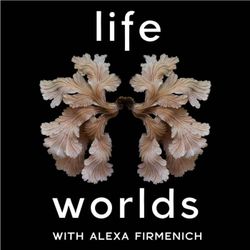Latest episode
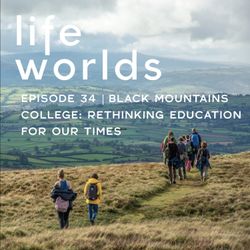
34. 34. Black Mountains College: Rethinking Education for Our Times
58:12||Season 3, Ep. 34Today’s episode explores a simple but urgent question: is our education system still fit for the world we’re entering? Climate disruption, AI, and uncertainty demand new forms of education fit for complexity and change.A rich lineage of alternative and experimental education has been evolving for decades, seeking to make learning more holistic, place-based, creative, and ecologically grounded. The focus of today’s conversation is one of those institutions: Black Mountains College in Wales. BMC is building a university model explicitly designed for a warming world, where nature is often the classroom and curriculum blends ecology and climate science with the arts, systems thinking, and community-rooted practice.I’m joined by its co-founder and CEO, Ben Rawlence, award-winning writer and former human rights researcher, to explore:The historicity of Western educational systemsWhat the role of a university should be in societyBlack Mountains College as model of the future of education The role of ecological imaginationYouth, eco anxiety and the challenges of parenting in today’s planetary momentEpisode Website Links:Black Mountains CollegeThink Like a Forest by Ben RawlenceGuardian: ‘We create changemakers’: the new UK college dedicated to climate crisisBMC and ecological imagination by Joseph Rowntree FoundationList of alternative schools and earth centered curriculum centersThe Solutions are Already Here: Strategies of Ecological Revolution from BelowBritt Wray on Climate GriefFuture CouncilRe-imagining education conference Look out for meditations, poems, readings, and other snippets of inspiration in between episodes. Music: Electric Ethnicity by Igor Dvorkin, Duncan Pittock & Ellie Kidd
More episodes
View all episodes
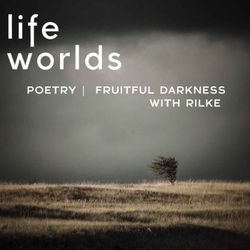
Poetry | Fruitful Darkness with Rilke
17:42||Season 3, Ep. 0This Lifeworlds episode is a devotional journey into the work of Rainer Maria Rilke, the lyrical German poet of thresholds and embracing transformations.Through readings of his most luminous poems and writings, we explore how Rilke guides us deliciously in reconciling suffering and turmoil with tremendous beauty. It’s an offering for anyone standing in the in-between, for those moving through sublimation, and longing for those secret, dazzling encounters with primal life forces. Rilke’s words are an invitation in. To move towards. His poems are prayers…. “to go out into our hearts as onto a vast plain, so that life can feel us as it reaches for us.”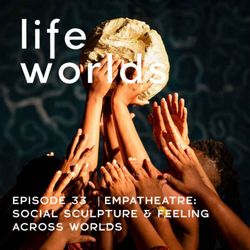
33. 33. Empatheatre: Social Sculpture & Feeling Across Worlds
01:17:20||Season 3, Ep. 33In this episode, we explore the role of theatre and empathy in transforming worldviews. Dr. Dylan McGarry is one of the founders of Empatheatre, a South African theatre-making company and methodology that turns research and storytelling into living social sculpture. Their plays create what they call amphitheatres for empathy - spaces where art, ritual, and dialogue help people listen across difference, from mining conflicts to ocean governance to human-wildlife coexistence.Empatheatre’s productions have brought together communities, policymakers, and activists that rarely meet, showing how imagination can transform civic life. The process of creating the plays generates profound potentials for restorative justice. As Dylan says, empathy is not about agreement, but about creating a vessel strong enough to hold our differences while keeping us in relation.We will cover:Empathy as a creative actTheatre and storytelling as Trojan horses that open conversations that traditional politics often can’tHow to design spaces that allow lifeworlds to touch and the practices that help us shift into another’s perspectiveHow empathy, when practiced collectively, becomes a form of governance: a new infrastructure for democracy and careEpisode websiteLinks:Share your input for the whale productionEmpatheatreDylan’s PHD5min Empatheatre docIndlela Yokuphila: The Soul's Journey (ZULU) film & the radio play used in the court caseLalela Ulwandle TrailerUmkhosi Wenala doc about Zulu musical on indigenous traditions & animist relationshipsSteiner’s 12 sensesMOTHProject CETIKaren BakkerUndrowned: Black Feminist Lessons from Marine MammalsOne Ocean Hubdylanmcgarry.orgInstagram: @dylan_mcgarryPhoto Credit: Casey Pratt. It captures a significant moment in a collaborative theatre-making & storytelling project titled "Umkhosi Wenala"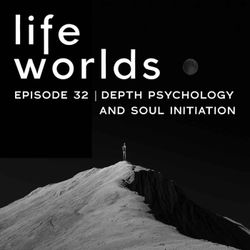
32. 32. Depth Psychology and Soul Initiation – with Bill Plotkin from Animas Valley Institute
01:14:45||Season 3, Ep. 32In this episode, I sit down with Bill Plotkin, founder of Animas Valley Institute. Over the past 40 years, Bill has developed intricate, nature-based models of human development and education that challenge dominant psychological frameworks and invite us into a maturation process rooted in wholeness, wildness, and the more-than-human world.We explore their three major maps of a person’s “soul-centric journey” and cover topics including:Why most modern humans remain developmentally stuck in early adolescenceThe 8-stage Soulcentric Developmental Wheel and how it mirrors nature’s rhythmsThe four cardinal facets of the psyche, and the inner protectors that distort themWhether other species undergo their own versions of soul initiationWhy the path to a mature culture will not come from the strategic mind, but from descent, mystery, and imaginationThis is a deep-dive into a body of work that’s revolutionizing the lives of thousands of people, and how to think about adulthood, education, and healthy human cultures.Episode Website LinkLinks:Animas Valley InstituteAnimas Valley OfferingsSoulcraft: Crossing into the Mysteries of Nature and PsycheNature and the Human Soul: Cultivating Wholeness and Community in a Fragmented WorldWild Mind: A Field Guide to the Human PsycheThe Journey of Soul Initiation: A Field Guide for Visionaries, Evolutionaries, and RevolutionariesParable of the TribesLook out for meditations, poems, readings, and other snippets of inspiration in between episodes.Music: Electric Ethnicity by Igor Dvorkin, Duncan Pittock & Ellie KiddPhoto Credit: Midjourney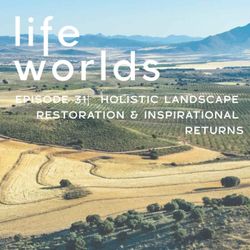
31. 31. Holistic Landscape Restoration and Inspirational Returns – with Willem Ferwerda from Commonland
01:08:40||Season 3, Ep. 31Almost 40% of Earth’s land is degraded, meaning that the natural cycles that sustain biodiversity, water, food, and livelihoods are breaking down. This degradation is an ecological crisis, and, it also lies at the root of massive social breakdown, displacement, and conflict. And it’s accelerating.In this episode, I speak with Dutch ecologist and entrepreneur Willem Ferwerda, founder of Commonland, one of the leading global initiatives tackling land degradation via large-scale holistic landscape restoration. Their work spans over 20 countries, with projects restoring millions of hectares from South Africa to Spain, Australia to the Netherlands. We get into their unique 4 Returns Framework - a powerful, intuitive model that integrates ecological, social, financial, and inspirational/spiritual returns.We talk about:Communities building long-term visions together across sectorsThe importance of meeting different audiences where they areThe role of storytelling, spirituality, and local leadershipHow restoring land helps restore meaning and purposeAnd how, ultimately, all this work is about regenerating lifeEpisode Website LinkShow links:The 4 Returns Framework in Practice4 Returns Framework Publication4 Returns Framework for Landscape Restoration4 Returns Diagnostic ToolThe Meaning of Laudato Si for a Landscape EthicTowards financing large-scale holistic landscape restoration in EuropeThe Trillion-Dollar Promise Of A Landscape Restoration Industry, ForbesWe must tackle global risks in an integrated way – here’s howHow the Ecosystem Approach supports “Cooperation in a Fragmented World"Albania landscape projectLook out for meditations, poems and readings in between episodes.Music: Electric Ethnicity by Igor Dvorkin, Duncan Pittock & Ellie KiddPhoto Credit: Commonland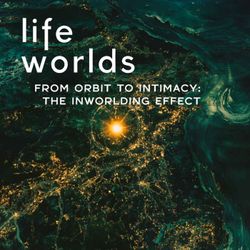
From Orbit to Intimacy | Beyond the Overview Effect
16:24||Season 0, Ep. 0What if the next shift in planetary consciousness didn’t come from looking back at Earth from space, but from listening deeply to the voices already here? In this thought piece I propose the “inworlding effect” as the overview effect of our time: one where developments in science, technology, law, and many other disciplines are revealing our entangled presence within a multispecies world.Medium Article LinkEpisode Website Link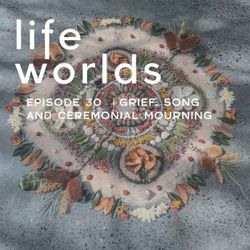
30. 30. Grief, Song and Ceremonies of Mourning - with Alexandra “ahlay” Blakey
01:05:29||Season 3, Ep. 30Today we’re joined by artist, musician and communal grief ritual facilitator Alexandra “ahlay” Blakey to speak about the cultural forgetting of communal mourning, the sacred role of professional mourners, and the re-emergence of grief ceremonies as necessary spaces of remembrance, healing and repair.Ahlay brings her experience weaving song, body, and ritual into collective spaces where grief is given breath and movement, and we explore the history of grief practices across cultures, the political power of public mourning, and how grief can soften the heart and stitch community back together. We explore what to expect in a communal grief ceremony, and ahlay shares the story behind her 200-voice album WAILS: Songs for Grief, inspired by whales, ancestral sorrow, and Francis Weller’s work. Within the episode are woven tracks of her haunting songs, so tune up your headphones, and sink in.Episode Website LinkShow Links:Healing at the Roots: ahlay’s websiteSong: Carry this AllThe Sacred Role of Eastern European Professional MournersSobonfu SomeWAILS: Songs For GriefOne Body Song Circle LiveFrancis WellerBook: Dangerous VoicesBook: Caliban and the WitchMartin PrechtelMyth of Lindworm: Martin ShawBandcampYoutube ChannelSpotifySoundcloudInstagramLook out for meditations, poems, readings, and other snippets of inspiration in between episodes.Music: Electric Ethnicity by Igor Dvorkin, Duncan Pittock & Ellie KiddPhoto Credit: Cover image (Earth Altering)
